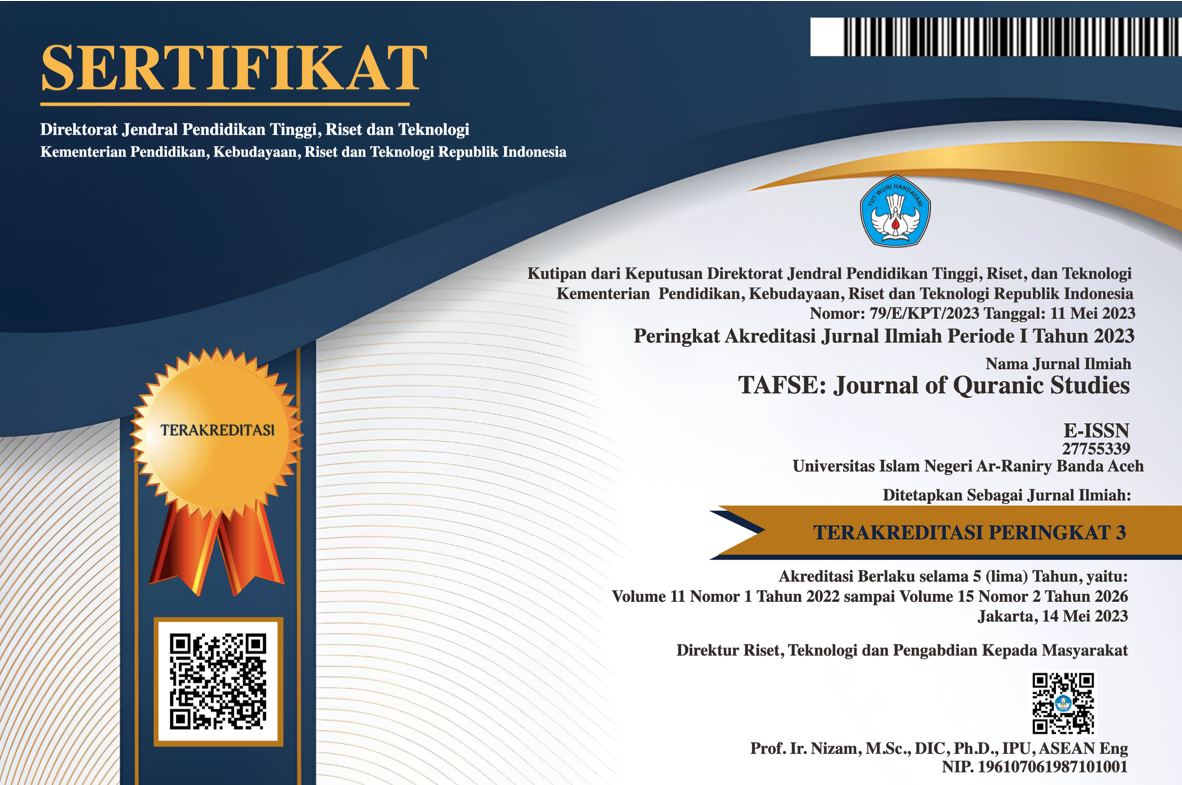Bai’at dalam Al-Qur’an menurut Pandangan Ibnu Katsir
DOI:
https://doi.org/10.22373/tafse.v4i2.13178Keywords:
Bai’at, Ketaatan, PemimpinAbstract
Bai'at is one way to show a person's form of obedience to his leader. An incomplete understanding of bai'at can cause slander among Muslims. Moving on from the problem above, the author will examine Ibn Kathir's interpretation of the verses of bai'at. This research is bibliographic and data collection is done through the mauḍū'ī method. The results of the study show that the person who betrays the bai'at to the leader on the basis of obeying Allah and the Messenger, then Allah will inflict punishment on him, on the other hand, for those who obey the bai'at in matters that are ma'ruf on the basis of obeying Allah and the Messenger, then he will get a reward from Allah swt. Imam Ibn Kathir interprets the verse of bai'at as meaning "whoever obeys the apostle, then he has obeyed Allah."
Bai’at merupakan salah satu cara dalam menampakkan bentuk ketaatan seseorang terhadap pemimpinya. Pemahaman yang tidak utuh terhadap bai’at dapat menimbulkan fitnah di antara umat islam. Beranjak dari persoalan di atas, penulis akan mengkaji tentang penafsiarn Ibnu Katsir terhadap ayat-ayat bai’at. Penelitian ini bersifat kepustakaan dan dalam pengumpulan data dilakukan melalui metode mauḍū’ī. Hasil penelitian menunjukkan bahwa Orang yang mengkhianati bai’at terhadap pemimpin atas dasar mentaati Allah dan Rasul, maka Allah akan menimpa azab baginya, sebaliknya bagi yang mentaati bai’at dalam hal yang ma’ruf atas dasar menaati Allah dan Rasul, maka ia akan beroleh balasan pahala dari Allah Swt. Imam Ibnu Katsir menafsirkan ayat bai’at sama artinya dengan “barangsiapa mentaati rasul, maka dia telah menaati Allah.”
Downloads
References
Abi Husain Muslim bin Hujjaj Al-Qushairi Annasaibury. Shahih Muslim. Juz, 1. Beirut: Darul Kitab Al-‘Alamiyyah, 1991 M./1421 H.
Abul Fida’ Ismai’l Ibnu Katsir Ad-damasyqi. Tafsir Ibnu Katsir, Terj. M.’Abdul Ghoffar EM dan Abu Ihsan al-Atsari. Cet. 4. Jakarta : Pustaka Imam asy-Syafie, 2012.
Ibn Manzur. Lisan al-Arab, Juz 3. Kairo: Da al-Ma’arif, 1119 H.
Ma’luf, Louwis. Al-Munjid Fi Lughah Wal A’lam. Beirut: Dar al-Masyriq, 1986.
Muhammad Fuad Abdul Baqy. Mu’jam al-Mufahras li al-Fazil Quran. Beirut: Dar al-Fikr, t.th.
Rosihon Anwar. Ulum Al-Quran. Bandung: CV Pustaka Setia, 2013.
Sa’id Hawwa. Tarbiyah Ruhiyah. Solo: Era Adicitra, 2010.
Said Agil Husin al-Munawar. Al-Qur’an Membangun Tradisi Kesalihan Hakiki. Jakarta: Ciputat Press, 2003.
Sayyid Quthb. Tafsir fi Zhilal al-Qur’an, Juz 26, Terj, As’ad Yasin Dkk. Jakarta: Gema Insani, 2000.
Syaamil Al-Quran (Al-Quran dan Terjemahan). Bandung: Syamil Al-Quran, 2007.
Tim Prima Pena. Kamus Ilmiah Populer. Surabaya: Gitamedia Press, 2006.
Downloads
Published
Issue
Section
License
Authors who publish with this journal agree to the following terms:
- Authors retain copyright and grant the journal right of first publication with the work simultaneously licensed under a Creative Commons Attribution License (CC BY NC 4.0) that allows others to share the work with an acknowledgment of the work's authorship and initial publication in this journal.
- Authors are able to enter into separate, additional contractual arrangements for the non-exclusive distribution of the journal's published version of the work (e.g., post it to an institutional repository or publish it in a book), with an acknowledgment of its initial publication in this journal.
- Authors are permitted and encouraged to post their work online (e.g., in institutional repositories or on their website) prior to and during the submission process, as it can lead to productive exchanges, as well as earlier and greater citation of published work (See The Effect of Open Access).





